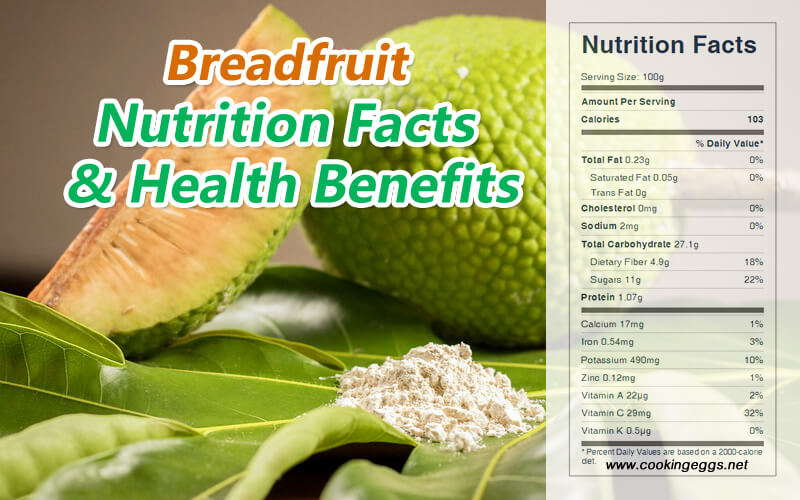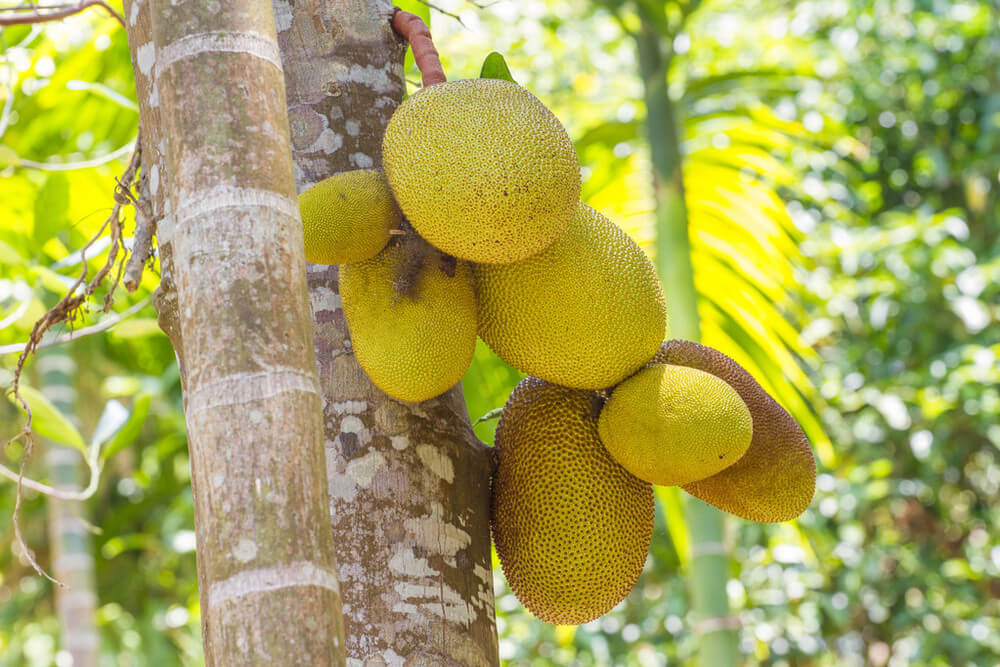Breadfruit Nutrition Facts and Health Benefits
Breadfruit gets its name from the fruit, which tastes like fresh bread and potatoes or yams when baked. Breadfruit is native to New Guinea and is now grown in South and Southeast Asia, the Pacific Ocean, the Caribbean, Central America, and Africa. The breadfruit contains a great number of essential nutrients with numerous health benefits.
The breadfruit (Artocarpus altilis) is a species of flowering tree in the Moracaea family, which also includes mulberry, jackfruit, and figs. It is regarded as a tree yam because the processed fruit is similar in taste to yam, a popular root and tuber crop in West Africa. Breadfruit fruits are rich in starch and have been an important staple crop for more than 3000 years. The unripe fruits are green-colored while ripe fruits are yellow-tinged (the yellow color is due to the presence of papayotin and artocarpin enzymes). The flesh is cream-colored, mealy, and starchy in texture. It is not eaten as a fruit but as a high-carbohydrate vegetable. Mature breadfruit is dark, dull, greenish brown, with stains on the surface from the milky sap that is exuded by the fruit. Fruits have latex exudates upon maturity, and latex has medicinal value.
Nutritional Value of Breadfruit
Breadfruit is an energy-rich food as it is a good source of complex carbohydrates and antioxidants. It’s gluten free, low in fat, and is a complete protein, providing all nine of the essential amino acids. In fact, the protein in the fruit has a higher proportion of amino acids than soy. Breadfruit is a rich source of vitamin C and a moderate source of thiamin and potassium. It also contains vitamins, B vitamins, fiber, and minerals such as calcium, iron, and magnesium.
Breadfruit contains 71% water, 27% carbohydrates, 1% protein, and negligible in fat. In a 100 gram amount, raw breadfruit supplies 103 calories, 27.1 g carbohydrate, 1.07 g protein, 0.23 g fat, 29 mg vitamin C, 0.11 mg thiamine, 17 mg calcium, 0.54 mg iron, 25 mg magnesium, 490 mg potassium, and 0.12 mg zinc.

Raw Breadfruit Nutrition Facts Label
Health Benefits of Breadfruit
Boosts Immunity
Breadfruit can improve your immune system. Pharmacological studies have indicated that some flavonoids from breadfruit have anti-inflammatory activities, which is particularly important for reducing the risk of disease. Breadfruit is also highly rich in vitamin C, which helps scavenge harmful, pro-inflammatory free radicals by virtue of its antioxidant properties. Vitamin C also boosts immunity to fight against flu, coughs colds, etc.
Help Prevent Diabetes
Breadfruit is rich in dietary fiber, which is very beneficial for our overall health and also helps to prevent diabetes. Fiber has uniquely significant physical effects in the gut and, through fermentation, is a major determinant of large bowel function and bowel habit. Fiber rich diet can help to control blood sugar in diabetics, reduce blood lipids (a risk for heart disease), and help to control weight. Its physical properties in the small bowel affect lipid absorption and the glycemic response. Fiber has some modest effects on appetite. These benefits feed through to a protective role in large bowel cancer, diabetes, and coronary heart disease.
Antioxidant Activities
Breadfruit is high in antioxidants that are needed to prevent a variety of severe diseases, including cancer. Breadfruit is high in phenolic compounds and antioxidant vitamins like vitamin C, E, and carotenoid. When you eat a diet full of high-antioxidant foods, you can slow the age-related breakdown of your cells as well as reduce your risk of cancer, heart disease, stroke, and other diseases.
Improve Heart Health
Breadfruit is an excellent source of potassium. This mineral helps to reduce blood pressure in the body and controls the heart rate by reducing the effects of sodium. It also offers protection from low potassium, a leading cause of congestive heart failure. Another way it’s beneficial to the heart is through its ability to combat high cholesterol. Breadfruit is also incredibly high in fiber, and dietary fiber helps reduce cholesterol by preventing its absorption in the gut. It lowers bad cholesterol while elevating good cholesterol in the body. It decreases the triglyceride levels, which is one of the main causes of heart attacks.

Hair Health
Breadfruit is a good source of omega 3 fatty acids and omega 6 fatty acids, both of which help stimulate hair growth and maintain strong hair roots. They also help to regulate the sebum production in the scalp, decreasing dandruff and itchiness. It also prevents scalp inflammation and cell death, preventing hair loss.
Skin Health
Breadfruit inhibits the activity of pro-inflammatory enzymes and avoids overproduction of nitric oxide, therefore preventing skin inflammation. The Vitamin C content in breadfruit helps to promote collagen production, which provides elasticity to skin. Vitamin C plays a role in counteracting free radicals, or substances harmful to body cells. This makes the skin always glow and free of rashes.
Breadfruit Used in Traditional Medicine
- Breadfruit latex is used to treat sprains and broken bones
- Toasted flowers are used to treat toothaches
- Burned leaf ashes are applied to skin infections
- Breadfruit tree latex is used for hernia in children
- Decoction of the breadfruit leaf is believed to lower blood pressure and is also said to relieve asthma
- Eaten raw breadfruit has laxative properties